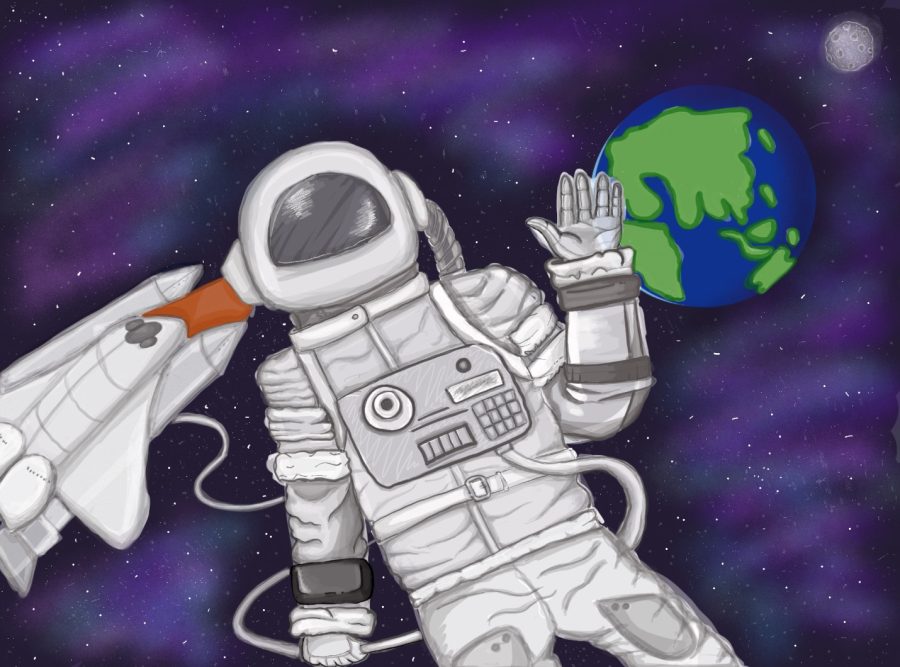Is Space Travel Worth It?
Space. The final frontier. An expanse of which we humans haven’t fully grasped. Our curiosity to learn more about where we live isn’t going to flicker away anytime soon, and neither will our fascination with what lies beyond the edge of our planet.
Space travel has embedded itself into our cultures ever since the 1000s with stories like” The Tale of the Bamboo Cutter” from Japan and the Middle Eastern “One Thousand and One Nights”. The inspiration for these folktales came purely from imagination and thirst for adventure. In the early 1900s, space travel entered the film industry with Méliès’ Le Voyage dans la Lune, drawing the idea closer to our realm of existence.
It finally became a reality 50 years ago when Yuri Gagarin became the first human to be launched to complete an orbit around the Earth. Ever since Gagarin’s feat, there have been over 300 such human space flights carrying hundreds of astronauts into outer space, including the first moon landing in 1969 with Apollo 11.
Space exploration has been a fruitful field, bringing us insights into technologies ranging from using satellites for communications, GPS and weather forecasting to developing platforms such as the Hubble Space Telescope that allow us to study the past of the universe.
Aside from these space agency missions taking trained astronauts to conduct research, there has been a newfound interest in a different form of space exploration: space tourism.
In this branch of space travel, private companies invest in spacecraft technologies for consumer use. US millionaire Dennis Tito was the first space tourist in history. He paid over 20 million dollars for a seven day trip to the International Space Station. But back in 1991, Tito had to pass several stages of training to be allowed to set foot off the Earth. Now, companies like SpaceX, Blue Origin and Virgin Galactic are offering a scaled down version of the same one-of-a-kind zero gravity experience.
The biggest commercial space travel company is considered to be Elon Musk’s SpaceX. It was founded with the purpose of cutting down space transportation costs and facilitating human colonisation of Mars but currently also offers commercial flights around the world and to the moon. Blue Origin by Jeff Bezos stands beside SpaceX with its rocket, New Shepard, that uses a vertical take-off and landing system to allow tourists to reach over 100 kilometers above Earth’s surface in just 10 minutes. The third of the “big three” private space companies is Virgin Galactic founded by Sir Richard Branson. Branson flew to space only nine days before Bezos in a SpaceShipTwo space plane. The latest event highlighting the experience of space travel is the trip of 90 year-old William Shatner (known for his role of Captain Kirk in Star Trek), who described it as there being “no words in the English language to relate.”
Private investments into space travel do bring many benefits: costs of travel are reduced since the competitor market is expanded beyond nation governments, and more people are allowed access into the industry without specialist training.
We see an increasing number of projects that promise tourists the opportunity to visit the International Space Station, swing around the Earth or fly by the moon, but what lies beneath these flights is what needs to be questioned. Clearly, it is impressive that our scientists and engineers can safely send untrained astronauts into space, but it comes at a cost of billions of dollars and the risk of making space travel an elitist activity. Questions about this are already being raised– only a few days ago, Prince William said to the BBC that “we need some of the world’s greatest brains and minds fixed on trying to repair this planet, not trying to find the next place to go and live.”
The main arguments against space travel prescribe prioritising action against climate change (not to mention the carbon emissions of the space planes and sky-high project budgets). At the same time, it is still crucial to consider the future of humankind– I see it as impossible that the number of space missions will dwindle because of the importance of discovery. It isn’t guaranteed that if we put all our efforts into our planet, we will reverse the destruction we have caused. Reserving resources for space exploration could provide a safety net for humanity when we see Earth drained of its treasures.
Space exploration is an investment that humans are making for the future through scientific studies. Space tourism, as much as it enables people to experience the astronaut journey, is currently only a business venture that presents a chance for the world’s millionaires to spend on momentary joy. If we want to choose between the two, the obvious choice is for our continued research on planetary environments that could save future generations.
Ultimately, when discussing priorities, it comes down to weighing the needs of Earth’s poorest and the desires of its richest… what if the five billion dollars that Bezos spent to enter space for ten minutes was spent for humanitarian aid or habitat restoration elsewhere on Earth?

Hi! I'm Pavi and I'm in Y13. This is my fourth year in The High. I love to write articles about current events or anything that catches my interest, really....





